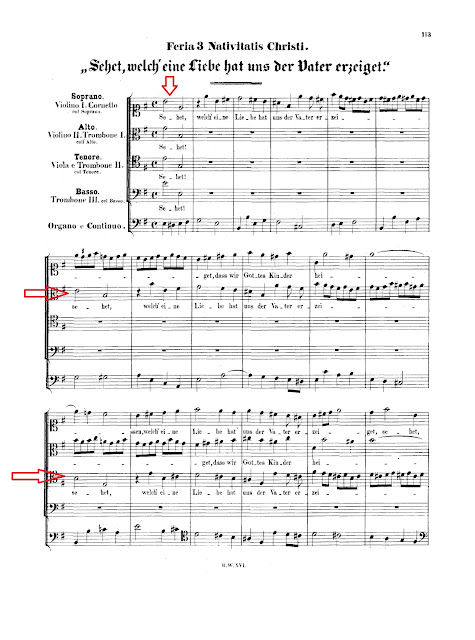DVIII. BACH, J.S. (1685-1750)
For the Third Day of Christmas, from Bach's first Leipzig cycle.
The text uses the occasion of Christ's birth to mediate on the futility of all worldly things.
The music is both severe and archaic.
1. [Coro]: Sehet, welch eine Liebe hat uns der Vater erzeiget
Fugal motet form in four parts, accompanied by trombones and cornett (zink).
The subject's entrances are staggered by six bars, entering SATB alternating between the initial tones of B and E:
Look ye! behold what love is on us bestowed by the Father, that the songs of God He calls us.
2. Choral (Coro): Das hat er alles uns getan
The first of three chorales in this cantata:
The might works our God hath wrought
Prove His constant loving thought
So joyful let all Christians be
And give Him thanks eternally
Kyrieleis!
3. Recitativo (Alto): Geh, Welt! behalte nur das Deine
Featuring running scales in the continuo, they seem to underscore the first words of the text, Geh, Welt! (Away!):
Away! thou world of fleeting pleasure
Keep thou thine own, I want none of it
In Heaven is my treasure
To this I hold, to cherish and to love it
Thy Gold is but a sorry thing
Thy riches transitory
The lord thereof
Has but an empty glory
So with a cheerful heart I sing
4. Choral (Coro): Was frag ich nach der Welt
attacca from the recitative.
What care I for the world
Whose riches men so cherish?
Its glories, goods and gains
Will in an instant perish
Its bickerings and hate
And all its vanity
If I but keep the Faith
What is the world to me?
5. Aria (Soprano): Was die Welt in sich hält
This da capo aria continues the severe treatment -- the gavotte-type dance structure hints of earthly pleasures, and the solo violin comes and goes like a cloud of smoke:
What on earth
Seems of worth
Like a cloud of smoke will vanish
But the love that Jesus gives
Love that in my spirit lives
Naught can e'er destroy or banish
Assured is Heaven now to me
By faith already I have gained it
Not Death, nor man, nor sin
Not yet the very Hosts of Hell
Can rob my soul, as God's own kin
Of Heaven where His Angels dwell
By Faith have I attained it
One thought, one thought alone has been a grief to me
That longer here on earth
My sojourn must bear
When Jesus offers Heav'n with me to share!
For such affliction man is fated
For this indeed was man created
7. Aria (Alto): Von der Welt verlang ich nichts
This lovely aria -- the alto accompanied only by an oboe d'amore and continuo -- is in the bright key of G Major, as the text deplores earthly things in favor of Heaven's promise. Note how the entire accompaniment drops away for the words While the hope of Heav'n I cherish:
Things of earth I value not
While the hope of Heav'n I cherish
All I have I cast aside
For in Thy Word do I abide
That I never shall perish
8. Choral (Coro): Gute Nacht, o Wesen
Faretheewell, O Pleasure
That we mortals treasure
Thou art naught to me
Faretheewell, Wrongdoing
Never more awooing
Will I come to Thee
Faretheewell, thou empty shell
Thine enchantment must I sever
Faretheewell, forever















No comments:
Post a Comment